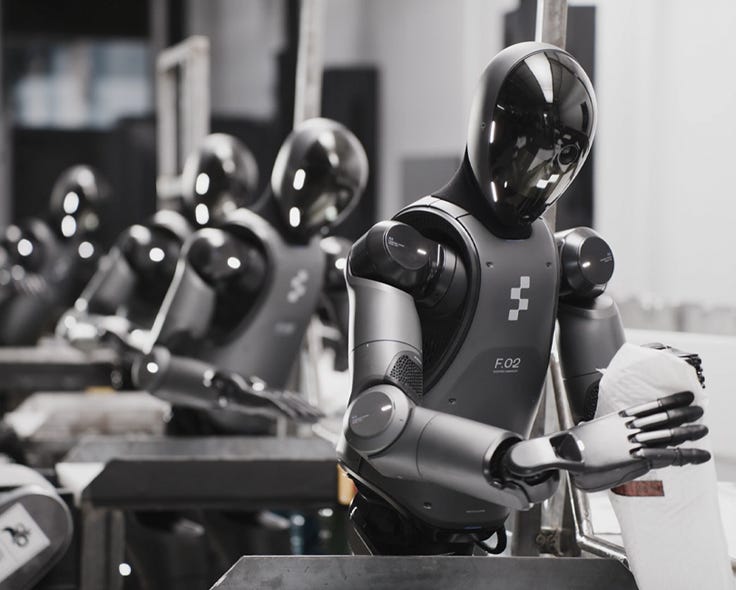Wow, it’s exhausting out there. Every time a new technology emerges, I get genuinely excited about what’s possible. But then the noise kicks in. These days, it pays to be loud and wrong, bold and clueless, to stir panic rather than understanding. Futurists get paid to be interesting more than helpful, so I’m not one of them.
Here’s my latest attempt to bring a little nuance back and be useful.
Deeper ones.
1 - Robots will take your chores.
I don’t know that much about (humanoid) robots but I do think they represent a really interesting tension in today’s world.
These days I see ever more videos of ever more amazing machines, with the promise of performance increases, price decreases and self-learning technology which makes them easy to use, to improve and to adapt and program.
In no particular order, some thoughts.
Something about these videos always looks really fake, maybe it’s skepticism born from distrust of a “fake it until you make it” era, or maybe the filming technique is weird.
They always looks much more like people than makes sense. If you wanted to make a really good robot, you’d start with wheels and low to the ground, making them human seems to freak people out, but it does have the massive bonus of making them MUCH easier to fit into a world that we’ve primarily built around people ( and cars). This is how technology starts, it fits into physical and mental spaces we have already.
It's quite easy to get excited, just imagine a home robot that does everything you ask for $20,000. No more ironing, cleaning, trips to get milk, no more changing the bed. Just imagine what this can do for people who need carers, the elderly, just imagine busy people with kids working 3 jobs, now able to rest a little. Imagine what this can do for productivity. One of the big questions of the current AI era is “what are we going to do with all this free time”, a question that always seems hilarious in retrospect.
At the same time, like most technology of this era, it makes me wonder if we’re being led by techno-optimizers, the sort of people who think food should be a tablet, friendship is more efficient if done online, that alcohol is illogical, the sort of people who want to live long, narrow, optimized lives, devoid of the inefficiencies that many call “living”.
Increasingly I tend to think that very little of life is something to outsource. It’s quite nice to fix the garbage disposal unit, it gives me a sense of mini progress to make the bed, cleaning is my meditation, cooking is my therapy.
2- The Ambient Internet.
For the first time in 8 years, I went on Facebook the other day. I got absolutely addicted to Facebook Marketplace, but also mindlessly scrolling. Here I was with a new baby, new puppy, a great wife, and I was mesmerized by videos of snooker, boats going through choppy water, courses on how to make $50k a month using AI, literal car crashes, soccer technique, and AI-generated women with fake fake breasts.
Technology people have decided the phone is the issue. It would be better if we wore the Internet on our face, or if cameras were on glasses, or that something could overhear everything we said and interrupted us. It's almost like no one remembered the complete failure of the Humane Pin.
Alas, here we are again, a new “smartphone killer”. I wish people would realize that the problem isn't the form factor of the phone, the problem is the incentives that drive software and services or at least the stupid KPIs.
The only thing Netflix should really care about is how happy people are with the service. Instead, they take time spent on Netflix as an easy-to-measure proxy for happiness, and then do everything they can to increase time spent, by automatically suggesting incredibly bad shows. But because they autostart, we become transfixed by the mundane cheap crap that algos know we can’t stop watching.
If we want to fix the screen addiction problem, we need to rewire the industry, not the device. And we also need some discipline.
3- The Agentic Era is probably nonsense
The world is really complex, with old software, technical debt, data is all over the place, databases that can't talk to each other, and complex security, permissioning, and governance.
When Web3 came along, it was driven by the hope that new plumbing would change all of this, but it turned out life was more complicated than that. Now we have AI agents; the dream is that they provide a new interface onto the old web.
Rather than my using Condé Nast Traveller to fall in love with Montenegro, Kayak to find a flight, and BA.com to buy a ticket, I’ll just say to a bot, “Take me somewhere nice,” and it will handle everything.
A couple of things hit me about this.
Most people quite like shopping for most things.
The rationale that people use to choose things is often quite unexplainable; Zurich or Madrid airport makes me happier for transfers than Heathrow.
The BA website is almost impossible to use and always down. Why would a robot be luckier than me?
Most companies have spent years keeping bots off (CAPTCHAs, anyone?). Why would they now let the most powerful bots ever have free reign
Every demo of an agentic flow didn’t really work.
Everything online is always changing; the moment anyone in the chain changes anything, the system could fail.
So I was very unsurprised to hear that Cloudflare is blocking bot access this week
Podcast of the month
Cybersecurity used to be a technical backroom topic, but in the age of AI, it becomes a topic for everyone in the boardroom.
It’s great to “move fast and break things”, but security risks are existential.
As AI accelerates threat complexity and the attack surface grows by the second, staying ahead isn’t optional.
That’s why I’ve been tuning into Threat Vector, a podcast from Palo Alto Networks that goes beyond the headlines, and into depth with a rare thing, deep experts with clear advice.
It’s sharp, fast, insightful with real perspectives from industry leaders tackling real problems.
If you care about the future of security, trust, AI, or the future survival of your company, this is well worth your time.
Check it out at https://www.paloaltonetworks.com/podcasts/threat-vector
Shallower Ones
1 - Magical to Mundane in seconds- I’ve been slow to try Waymo. It happened this week in San Francisco; it was both the most magical (the first 90 seconds) and the most boring (the next 13 minutes) experience I’ve ever had.
It felt quite lonely and sad, and it was precisely the same as any Uber I’ve ever had, just without the feeling someone who deserved it was getting paid. As with many technologies, the initial impact isn’t huge; it just fills the same gap. The real change will come when robotaxis thrive in rural areas where Uber makes no sense, when cities turn car parks into thriving spaces, when cars communicate to reduce congestion, and when buses become intelligent and dynamic. It’s the second- and third-order impacts that will be enormous.
2- Gene editing will probably be one of the biggest issues of this generation, we've been saying that for a long time, but you can just see it happening now. Turbocharging and entrenching privilege forever?
3- The Internet made the cost of distributing stuff tend towards zero, AI has made the cost of producing stuff tend towards zero, an algorithm spread content far and wide. Content creation has basically become a casino, where every spin of the reel is free, and people have been making a fortune making endless videos for YouTube, or images for Pinterest, or fake news for Facebook, and nobody seemed to care, until now. I’m so happy YouTube is banning slop
Wider Ones
Economic miracles stem from discovery, not repeating tasks at greater speed
We have no idea how to value companies.
Calm down, why FOMO isn’t a strategy
A raspberry pi, but for robots. Good work Hugging Face
The rise of the Japanese toilet
The world's first Hydrogen economy?
Why is modern commerce corrosive?
Half the money I spend on bureaucracy is wasted
How does United Airlines pick weird places to fly to?
Older Ones
A deck I made about Trends in 2015, I’m mega proud of it.
Me me me
Right now I’m focusing on a new Workshop offering with Chris Johns of Bttr.
It's designed to help companies really understand what AI means for their business, and what to do about it.
I'll be talking more about it in the future, for anyone interested, get in touch.
That’s all for now.





“As AI accelerates threat complexity and the attack surface grows by the second, staying ahead isn’t optional” - correct. We are like the Aztecs encountering smallpox.
I think it’s less about companies believing there’s a better interface than the smartphone — and more about hoping one emerges. Otherwise, Meta, OpenAI, and others will be stuck competing with hardware providers for control over the user relationship.
On the agent point, there’s a lot of truth to that: planning a vacation is nice. However, buying ketchup and paper towels is not, and that's where agents can help. The fact that they still aren’t ready to handle even simple tasks is a whole other issue.